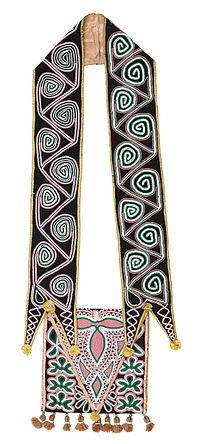Muscogee (Creek) people

Muscogee Creek bandolier bag, c. 1820, Birmingham Museum of Art
|
|
| Total population | |
|---|---|
| (2010: self-identified 88,332 alone and in combination) | |
| Regions with significant populations | |
|
|
|
| Languages | |
| English, Muscogee, and Hitchiti-Mikasuki | |
| Religion | |
| Protestantism, Four Mothers Society, and others | |
| Related ethnic groups | |
| Muskogean peoples: Alabama, Koasati, Miccosukee, Chickasaw, Choctaw, and Seminole |
The Muscogee, also known as the Creek and the Creek Confederacy, are a group of related Indigenous peoples of the Southeastern Woodlands.Mvskoke (English pronunciation: /məˈskoʊdʒi/; Mvskoke [maskóːkî]) is their autonym. Originally from Tennessee, Georgia, Alabama, and northern Florida, Muscogee people were forcibly relocated in the early 19th century to Indian Territory (now Oklahoma), Alabama, Louisiana, and Texas. Their languages, Muscogee and Hitchiti-Mikasuki, belong to the Eastern Muskogean branch of the Muscogean language family.
The Muscogee are descendants of the Mississippian culture peoples, who built earthwork mounds at their regional chiefdoms located throughout the Mississippi River valley and its tributaries. Early Spanish explorers encountered ancestors of the Muscogee when they visited Mississippian-culture chiefdoms in the Southeast in the mid-16th century.
...
Wikipedia
